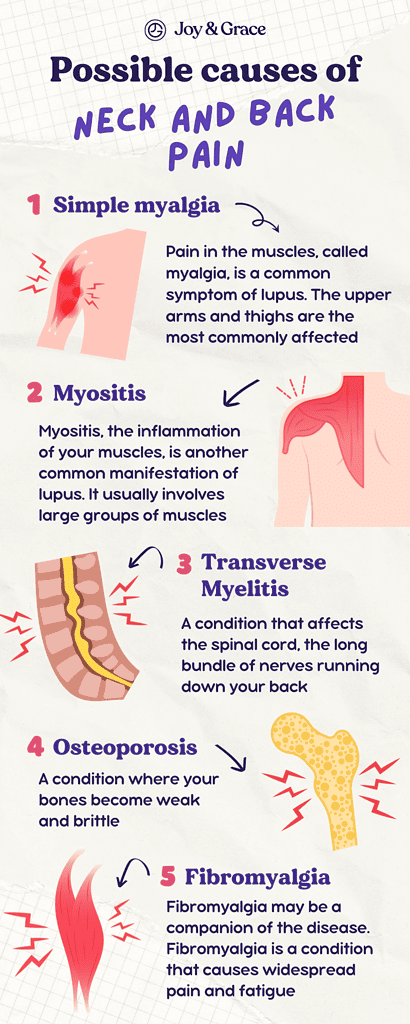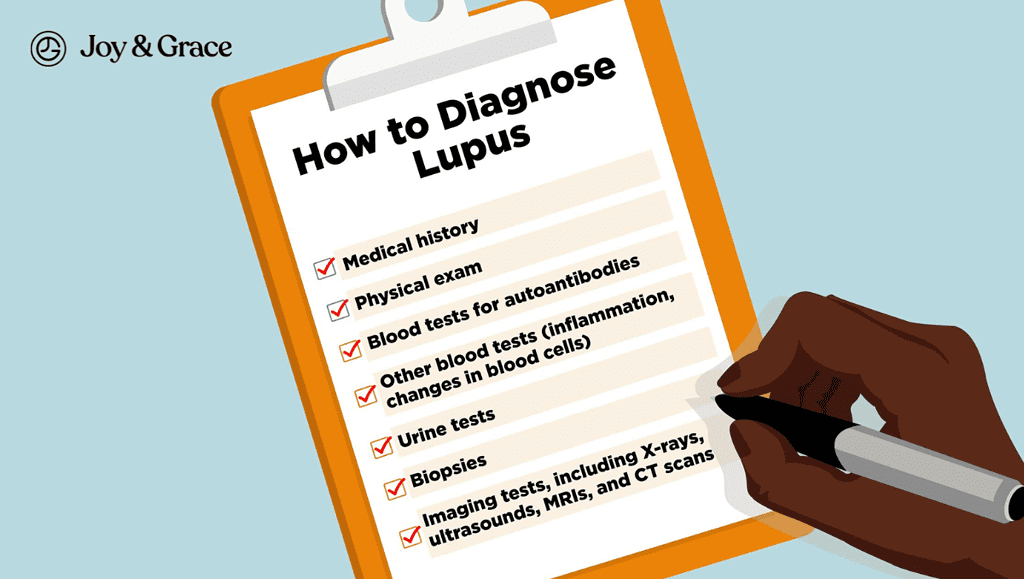According to the Lupus Foundation of America, 1.5 million Americans and 5 million people worldwide have lupus. Lupus is a chronic autoimmune disease affecting various body parts, including the joints and muscles.
Now, you might be wondering if your neck pain is from lupus. Don’t worry. We’re here to shed some light on the connection between lupus and the pain in your neck (and maybe shoulders!).
Can Lupus Affect The Neck And Back?

Yes, lupus can affect your neck and back. Lupus, or Systemic Lupus Erythematosus (SLE), is a chronic autoimmune condition that causes the immune system of the body to mistakenly attack healthy tissues and organs.
Neck and back pain in lupus is commonly muscular in origin. However, there are also other ways lupus can cause neck and back pain. Let’s review each possible cause:
- Simple myalgia
Pain in the muscles, called myalgia, is a common symptom of lupus. The upper arms and thighs are the most commonly affected. Muscle pain accompanied by weakness is commonly caused by myositis (muscle inflammation), which differs from myalgia (muscle pain only).
- Myositis
Myositis, the inflammation of your muscles, is another common manifestation of lupus. It usually involves large groups of muscles, such as your neck and back, resulting in back and neck pain. Aside from pain, 10.7% of patients with lupus myositis will have muscle atrophy (shrinking) and weakness.
- Transverse Myelitis
Transverse myelitis is a rare complication of lupus that is more common in women. It is a condition that affects the spinal cord, the long bundle of nerves running down your back. Aside from neck and back pain, common symptoms include:- Weakness in arms and legs
- Tingling, numbness, or burning in your arms and legs
- Problems with urination and bowel movement
- Osteoporosis
Osteoporosis is a condition where your bones become weak and brittle. According to studies, osteoporosis can occur in 5-20% of SLE patients.
Osteoporosis from SLE can be due to a combination of the following:- Inflammation
- Hormones
- Genetics
- Medication
Symptoms of osteoporosis include
-
- Back pain
-
- Loss of height
-
- A hunched back
-
- Frequent bone fractures
A study shows that 18-50% of SLE patients can have vertebral fractures.
-
- Fibromyalgia
SLE does not directly cause fibromyalgia. However, fibromyalgia may be a companion to the disease. Fibromyalgia is a condition that causes widespread pain and fatigue. According to a study from 2015, the prevalence of fibromyalgia in SLE patients is 12%.
- Fibromyalgia
Arthritis is also a common musculoskeletal manifestation of lupus. However, lupus arthritis usually spares the spine and attacks the peripheral joints. These are the joints of your shoulders, arms, hands, legs, and feet. Involvement of the cervical spine (neck) is considered rare.
Can Lupus Cause Neck And Shoulder Pain?
As we established above, lupus can indeed cause neck and shoulder pain. The complications of lupus we mentioned earlier can cause both neck and shoulder pain. In one study, 39.2% of patients had arthritis in the shoulder. Lupus can also cause inflammation in the tendons of your shoulder, causing tendonitis.
Another way lupus could contribute to shoulder pain is by causing rotator cuff injuries. However, this is extremely rare. In the study we mentioned earlier, only one patient out of 97 had rotator cuff syndrome.
What Does Lupus Neck Pain Feel Like?

While lupus can cause neck pain in some individuals, it's important to note that neck pain can have various causes, and not all cases of neck pain are related to lupus. In fact, neck pain alone (without other symptoms) is an extremely rare presentation of lupus.
That said, if neck pain is associated with lupus, it may feel similar to neck pain caused by other conditions. Common characteristics of lupus-related neck pain may include:
-
- Dull or aching pain
-
- Sharp, shooting, or stabbing pain
-
- Stiffness that may be worse in the morning or after periods of inactivity
-
- Muscle tenderness
-
- Pain that radiates to the shoulders, arm, or upper back
Does Neck Pain From Lupus Go Away?
Lupus affects people in different ways. Some may have more severe symptoms that last for a long time, while others may have milder symptoms that come and go.
When lupus becomes active, it's called a flare-up; symptoms like neck pain can worsen during these times. However, there are also times when the symptoms improve or go away completely, known as remission.
However, lupus is a chronic condition, and you may have to fight with several flare-ups your entire life.
Lupus Symptoms: What Are The Early Warning Signs Of Lupus?

Lupus can affect almost any organ in your body and cause a variety of early symptoms, including:
-
- Fatigue. Fatigue is the most common complaint. According to a study, 67 to 90% of lupus patients have it, which can sometimes be so bad that the person can't do anything. Its presence is not clearly linked to other measures of disease activity and is more often linked to depression, sleep problems, and fibromyalgia.
-
- Muscle and joint pain
-
- A butterfly-shaped rash across the cheeks and bridge of the nose (malar rash)
-
- Increased sensitivity to sunlight (you might feel like a vampire in broad daylight)
-
- Unexplained fever
-
- Hair loss
-
- Fingers and toes that turn white or blue in response to cold temperatures or stress (Raynaud's phenomenon).
-
- Chest pain and breathing difficulties
-
- Blood or protein in the urine
-
- Frequent urination
-
- Swelling in the legs and ankles.
The signs and symptoms of lupus are also different for each person. For example, someone with lupus might have a fever and swollen knees.
Someone else might always be tired or have problems with their kidneys. Certain people may have rashes. Over time, some symptoms may become less common, or new ones may appear.
Lupus symptoms also usually come and go, meaning that you don’t have them all the time.
Remember, these symptoms can also indicate various other conditions. Experiencing one or more of these symptoms doesn’t necessarily mean you have lupus.
How Do I Know If My Neck Pain Is From Lupus?

If you're experiencing neck pain, it's highly unlikely that it is directly related to lupus.
Lupus primarily manifests with symptoms like:
-
- Fatigue
-
- Fever
-
- Rash
-
- Muscle and joint pain
-
- Weight changes, such as weight loss or weight gain
Neck pain is not typically a prominent or initial symptom of lupus. Furthermore, even if additional symptoms hint at lupus, it's important to remember that symptoms alone aren’t enough to diagnose the condition. A doctor's expertise and specific tests are necessary for an accurate diagnosis of lupus.
It is important to note that neck pain can have various causes, such as muscle strain, poor posture, or other unrelated conditions.
However, if you have concerns about your health, it's always advisable to consult a medical professional. They can provide a thorough evaluation and offer appropriate guidance.
To identify if your neck pain is due to lupus, you’ll need to visit a healthcare professional who can assess your symptoms and medical history. The doctor will likely perform various tests, such as:
-
- Physical exam
The doctor will examine your neck for signs of inflammation. They may also assess other joints and areas of the body to gather more information.
- Physical exam
-
- Blood tests
Lupus can be detected by analyzing specific antibodies and other markers in your blood. Blood tests can help identify the presence of autoantibodies commonly associated with lupus, such as:
-
- Antinuclear antibodies (ANA)
-
- Anti-double-stranded DNA (anti-dsDNA) antibodies
-
- Anti-Smith (anti-Sm) antibodies
-
- Blood tests
-
- Imaging tests
Sometimes, the doctor may request imaging tests to get a clearer view of your neck and surrounding structures. These tests can help identify any abnormalities or damage contributing to your pain.
- Imaging tests
Remember, most cases of neck pain can be effectively managed, and there's no need to worry about it being directly linked to lupus.
What Makes Lupus Pain Worse?
While the exact causes of lupus pain are not fully understood, several factors can worsen pain or trigger a flare. Here are some common triggers:
-
- Overexertion
-
- Sun exposure
-
- Stress
-
- Infections
-
- Smoking
-
- Alcohol
-
- Poor sleep
-
- Certain medications
What Should I Not Do If I Have Lupus?

Aside from everything we mentioned above, it’s important to avoid the following:
Ignoring symptoms
Always pay attention to any changes in your symptoms and consult your healthcare provider promptly. Early detection and treatment of lupus flares or complications can help prevent further pain and damage.
Skipping medications
Follow your prescribed treatment plan and take your medications as directed. Skipping or altering doses without medical supervision can lead to disease flares and increased pain.
Additionally, confirm that your doctor or nurse is aware of your lupus when they administer medication. Some medications worsen lupus symptoms. It's crucial that you refrain from taking them.
Skipping your doctor’s appointment
Skipping your doctor visits when you have lupus is generally not advisable. Here's why it's important to attend your doctor visits:
-
- Monitoring disease activity
Regular check-ups allow your healthcare provider to assess your condition and monitor disease activity. This can help prevent serious complications.
- Monitoring disease activity
-
- Medication management
Your doctor’s visit provides an opportunity to discuss your current medications and other treatment options. You can report any potential side effects or concerns you may have. And the doctor can make any necessary adjustments to your treatment plan.
- Medication management
-
- Education and guidance
Your doctor can provide valuable education about lupus. They can also offer guidance on managing flares and maintaining overall health.
- Education and guidance
-
- Emotional support
Living with a chronic illness like lupus can be physically and emotionally challenging. Your visit to the doctor allows you to discuss your concerns, fears, and emotional well-being. They can support and connect you with resources and support groups offering additional assistance.
- Emotional support
Living a sedentary lifestyle and having a bad diet
It's important to keep moving even if you don't feel well. If you rest too much, your muscles will weaken, making you feel worse in the long run.
As for a healthy diet, a balanced diet that includes lots of fruits and vegetables can be beneficial.
How Do Doctors Treat Lupus Neck Pain?
There is no specific treatment for neck pain, or any pain for that matter, caused by lupus.
There's currently no cure for lupus, so treatment only aims to control symptoms, prevent flares, and minimize complications. Here are some common approaches doctors use to treat lupus:
Medications:
-
- Nonsteroidal anti-inflammatory drugs (NSAIDs)
These can help with inflammation and reduce pain.
- Nonsteroidal anti-inflammatory drugs (NSAIDs)
-
- Steroid medications
Prednisone and other corticosteroids may also be prescribed to reduce inflammation and suppress the immune system. However, these drugs can have serious side effects, including muscle breakdown, osteoporosis, and bone death.
- Steroid medications
-
- Antimalarial drugs
Hydroxychloroquine is often used to reduce the number of flares and maintain remission. It also helps reduce the use of corticosteroids.
- Antimalarial drugs
-
- Immunosuppressive drugs
These drugs can help control the overactive immune response in lupus. These include medications like:
-
- Methotrexate
-
- Azathioprine
-
- Mycophenolate mofetil
-
- Cyclophosphamide
-
- Immunosuppressive drugs
-
- Biologics
Newer medications, such as belimumab, target specific components of the immune system to control lupus activity.
- Biologics
Lifestyle modifications, such a:
-
- Sun protection
-
- Gentle exercises. We got you covered! We have a list of gentle exercises for your neck and upper back.
-
- Rest and stress management
-
- Other therapies:
-
- Kidney disease treatment
-
- Psychological support
-
- Supportive care
-
- Other therapies:
Takeaway
In conclusion, neck pain is a possible symptom of lupus, affecting many patients. However, it's crucial to remember that sole neck pain is an extremely rare presenting symptom of lupus, and not all neck pain is related to lupus. Lupus is a chronic condition with varying symptoms that can come and go. However, with proper management and treatment, flare-ups can be controlled, and periods of remission can be achieved.
So, if you're experiencing neck pain and suspect it may be linked to lupus, don't hesitate to reach out to a healthcare professional. You can take charge of your health and find relief from lupus-related neck pain by seeking a proper evaluation.















